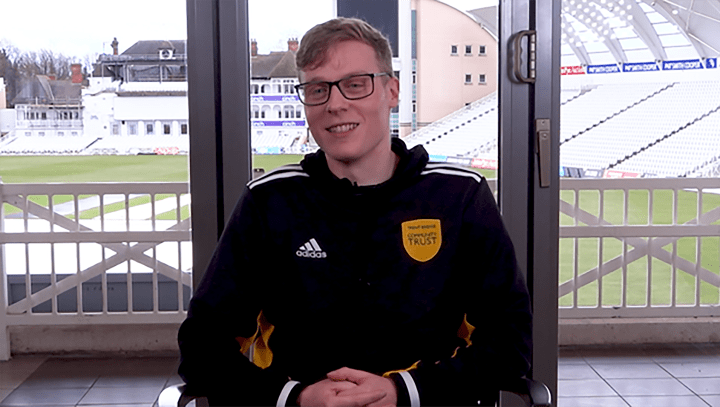In current society, there exists an uncomfortable truth.
The issue of mental health has seen a stigma become attached to it, with its effects seen as less serious than physical illness or injury. All too frequently, people living with mental health issues have their suffering unwittingly disregarded.
At the root, such stigma comes from the invisible nature of mental health, a fact which extends the difficulties beyond those faced by sufferers. There is no unit of measurement for emotions or feelings, and it can be a challenge for charitable projects aimed at helping people struggling with their mental health to provide tangible, quantitative evidence of their work.
Fortunately, the Trent Bridge Community Trust is proud to have a flagship individual who represents walking – and indeed working – proof of the success of their flagship mental wellbeing programme, Notts in Mind.
Aaron Taylor is a former participant on the project who is now a Wellbeing Coach with the Trust.
“I’ve always had mental issues, since I was a child, and I didn’t know what it was for the longest time, until recently when I found out I was on the autistic spectrum,” explains Aaron.
“I started coming to the football sessions with [Health and Wellbeing Officer] Ian Richardson, and that made a real difference to my mood and my mental health. It just gives you a point in the week to pivot around, and it’s really social, so at some points, that was my only time socialising during the week.”
The Notts in Mind programme provides anyone experiencing mental wellbeing difficulties with the opportunity to offload through a 90-minute discussion-based workshop and physical activity session.
Led by qualified coaches, the workshops focus on a range of wellbeing factors around anxiety, depression, healthy living and drug and alcohol misuse. All participants are given the opportunity to direct the conversations in ways that will help benefit them.
Aaron was one such individual who experienced first-hand the positive impact that even the most basic of interactions can provide, as he notes how focal the communications he had with the programme turned out to be in his weekly life.
“That was often the only time I’d get out and speak to people, and certainly the only time I was playing any sport or doing any exercise,” he says. “Knowing that it’s a really welcoming group was very important, and having the workshops has been really beneficial.
“We’ve got some people with really good mental health training, and they have a lot of knowledge that they can give you. We’ve had sessions on nutrition, alcohol and addiction, among a few others – all topics that are quite serious, but the people that deliver them make them quite easy to understand.”
Fostering those relationships with his group leaders at Notts in Mind had a directly positive impact on Aaron, though, as it turned out, there was also an unexpected side-effect.
Having only taken part in the programme for a short time, Aaron’s potential as a catalyst to help the Trust’s work scale new heights was quickly identified.
“I was asked by Ian Richardson to come and volunteer after meeting them on the programme,” he explains. “I was a bit hesitant at first, I suppose, having been out of work for such a long time, but after I went to the first session with Forget Me Notts… just walking into the room and seeing the participants’ faces and the carers, I think they were doing a sort of seated dance class, and they got Ian up doing some dancing as well!”
Forget Me Notts is another strand of the Trust’s mental wellbeing activities, focusing on providing activity-based sessions to those living with dementia, and though his origins are with another programme, it is in the Forget Me Notts area which Aaron has been able to make a worthwhile contribution.
Though separate from one another in their delivery, the Trust’s activities link together in an effort to benefit all concerned, and Aaron is now proud of not just the fact he walks along a two-way street in giving back to the organisation that aided him in the first place, but that helping others in a different area has further served to aid his journey too.
"I've had a lot of good feedback from the carers even though I’d only been there five minutes! To see the difference it was actually making, that cemented me wanting to come back every week, and it’s given me a lot of confidence.” he smiles.
“Over the last six months, I’ve really felt like I’m part of the team and that I’ve been making a difference, even if it’s only a small one. We’ve grown a lot already over the last couple of months, and I’ve been welcomed as a member of the team, so I’m just really excited to be part of that.
"I’m really happy to be working with the Trust now.”
